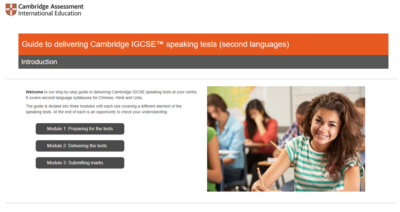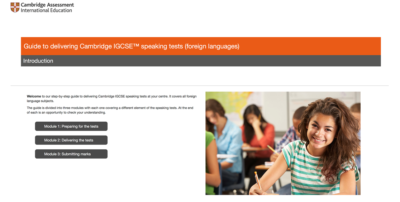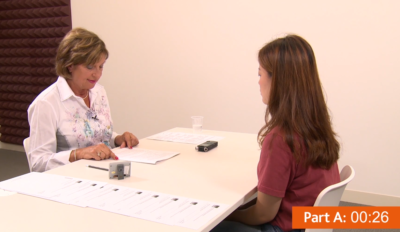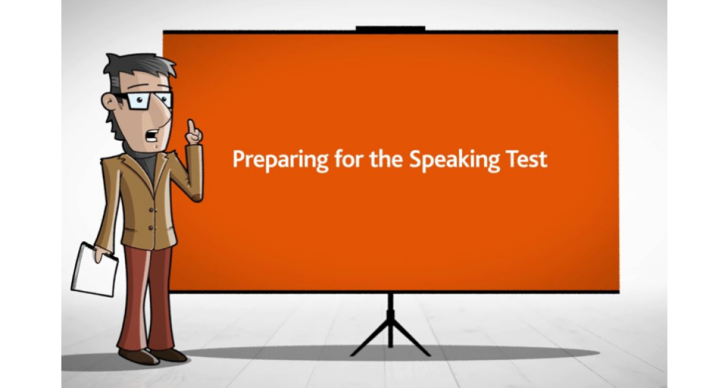Speaking tests can be frightening for candidates, but everyone involved – the candidates, the examining teachers, the exam board – want candidates to perform to their best ability.
All tests, whatever the type, or subject, can be scary for candidates but speaking tests certainly seem to be one of the most nerve-racking. In a written exam you have the time to think things through, but there is no such luxury in a speaking test – the clock is ticking and you have to think on the spot.
Not only this, you have to think in another language. This pressure is enough to make anyone tense.
If you make mistakes in a written exam, nobody else knows about it (not until you get the results at least) but in a speaking test, both the candidate and the examiner have to carry on whatever mistakes are made, which can be both embarrassing and painful!
Many candidates enter the room feeling uncertain and anxious – Will I remember anything? Will the right words come out? Will I understand the questions? Will I be able to impress the examiner in the short time available, to get the grade?

You could say that, for the candidate, success relies on two things – preparation before the test and performance during the test (in reality there is more to it than that of course).
However, the role of the examiner in all this should not be underestimated. Not only does the examiner have to keep the candidate calm and put them at ease, but also help the candidate keep to time, introduce all the sections of the test correctly and ask the right questions.
The examiner also plays an important part in giving candidates the opportunity to access the full mark range, pitching the test just right in terms of the level of challenge, and, of course, not forgetting to press record!
I have seen this process from very different sides:
- as the nervous teenager, with sweaty palms, in my own GCSE French and German speaking exams
- as the anxious teacher examiner not wanting to mess anything up for my students and just hoping they do the very best they can
- as the stressed Deputy Head of a modern languages faculty, jointly in charge of moderating speaking tests – ensuring good practice, parity of marking and accuracy of paperwork across the whole department
- and finally now, as an employee of Cambridge International, leading on providing support for languages, working on how best to support learners, teachers and examiners in this challenging process
To help everyone involved in performing well in speaking tests, we have recently created new Guides to delivering Cambridge IGCSE™ speaking tests.
Guide to delivering Cambridge IGCSE speaking tests (second languages) – new (for current syllabuses for assessment until 2020)
This is an online guide to delivering Cambridge IGCSE speaking tests that includes guidance on preparing for, conducting and delivering the tests, as well as submitting the marks to Cambridge International. It applies to the following Cambridge syllabuses:
- Cambridge IGCSE Chinese as a Second Language 0523
- Cambridge IGCSE Urdu as a Second Language 0539
- Cambridge IGCSE Hindi as a Second Language 0549

Guide to delivering Cambridge IGCSE speaking tests (foreign languages) – updated (for current syllabuses for assessment until 2020)
As above, this is also an online guide which includes guidance on preparing for and carrying out the tests, as well as sending the marks to us. This applies to the following syllabuses:
- Cambridge IGCSE Arabic 0544
- Cambridge IGCSE Mandarin Chinese 0547
- Cambridge IGCSE Dutch 0515
- Cambridge IGCSE French 0520
- Cambridge IGCSE German 0525
- Cambridge IGCSE Greek 0543
- Cambridge IGCSE Indonesian 0545
- Cambridge IGCSE Italian 0535
- Cambridge IGCSE Japanese 0519
- Cambridge IGCSE Malay 0546
- Cambridge IGCSE Portuguese 0540
- Cambridge IGCSE Spanish 0530
- Cambridge IGCSE French (9–1) 7156
- Cambridge IGCSE Italian (9–1) 7164
- Cambridge IGCSE Spanish (9–1) 7160
- Cambridge O Level French 3015

Guide to delivering Cambridge IGCSE speaking tests (English as a Second Language) – new (for examination from 2019)
This video helps teachers of Cambridge IGCSE English as a Second Language 0510 and 0511 to prepare for and undertake the speaking test component 05 of the syllabus. The video uses a mixture of animation and a filmed demonstration of a live speaking assessment. The guide covers:
- how to set up the speaking test room
- how to time each section of the speaking test
- how to correctly record the candidate
- where to find necessary forms and how these should be completed and returned to Cambridge International

We encourage teacher examiners to engage with these resources and all the resources we provide to support our Cambridge IGCSE speaking tests.
I really think these resources will go some way to reduce the stress around speaking tests – let us know what you think in the comments!





